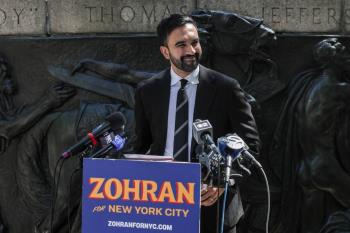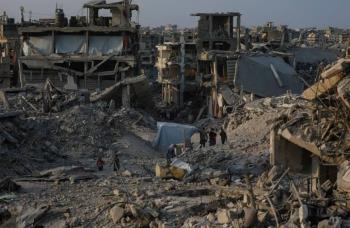Alwaght- Iraq election process has entered a period of silence on Saturday morning and according to the schedule, special early voting will be held on Sunday, followed by the main nationwide election for the general public on Tuesday.
The Independent High Electoral Commission (IHEC) announced in a statement that "the electoral silence period begins at 7 a.m on Saturday and will continue until the conclusion of the general voting process." The statement emphasized that "any promotional or campaign activity by candidates or electoral lists during this period is a clear violation of the regulations, and legal action will be taken against offenders."
The IHEC stressed that "the purpose of the electoral silence is to create a calm and balanced atmosphere, allowing voters to think freely and choose their representatives without last-minute influence or propaganda."
The commission called on political entities and media to "fully adhere to the rules of the electoral silence period and refrain from any media or field activities aimed at election campaigning." It emphasized that "adherence to the law is essential for the success of the electoral process and guarantees its integrity and transparency."
The Independent High Electoral Commission recently announced that violating the electoral campaign silence period will lead to the candidate's disqualification, even if the candidate wins the election, as their votes will be nullified.
Jumana al-Ghalai, the spokesperson for the commission, explained that "the electoral silence period includes refraining from publishing materials through media and social media platforms, not holding electoral conferences and seminars, not sending text messages, and anything else related to methods of dissemination."
Number of Eligible Voters and Updated Information:
The IHEC announced that the number of eligible voters for the upcoming elections has exceeded 29 million.
The commission also reported that the number of registered voters, after updating biometric data, has reached approximately 21,223,319.
It is noteworthy that one day before the start of the electoral campaign, the commission had approved the names of 7,768 candidates competing for 329 seats in the Iraqi Council of Representatives.
Special early voting: over 1.3 million military personnel and 26,000 displaced civilians
Though the main part of the voting will start on Tuesday, on Sunday morning special segments of the society will vote. Al-Ghalai, the spokesman to the IHEC said that the voting process will commence tomorrow across the country at 7:00 a.m, covering the security forces, military personnel, and the displaced.
According to Al-Ghalai, a total of 1,313,980 security personnel are eligible to vote in the special election. These voters are distributed across 809 polling centers, encompassing 4,501 individual stations spread throughout the country's provinces.
Regarding displaced persons, she confirmed that 26,538 registered voters will cast their ballots at 27 dedicated polling centers, which host 97 stations. Due to their exceptional circumstances, special measures have been implemented to facilitate their participation in the election.
She further noted that the commission has completed all logistical and technical preparations to ensure the electoral process runs smoothly. Technical teams are on standby to monitor and address any emergencies that may arise during the voting.
"Special voting" in Iraq is a separate day dedicated to groups who cannot go to the polls on the general election day due to the nature of their jobs or living conditions. These groups include security and military forces, certain employees in sensitive sectors, displaced persons living in camps, and sometimes prisoners who cannot access public polling centers. The aim of this mechanism is to ensure that these individuals' work or environmental circumstances do not prevent them from participating in the electoral process.
The list of those eligible for special voting may change slightly each election cycle, but it generally includes the army, police, counter-terrorism forces, security personnel of the Kurdistan Region, Popular Mobilization Forces (in some cycles), staff at border crossings and airports, and some judicial and correctional facility employees.
Displaced persons residing far from urban centers, as well as some prisoners, are also included in this special voting, provided there is coordination between the Ministry of Justice and the IHEC.
Special voting is typically held one day before the general election to prevent security forces' duties from interfering with the election process and to reduce crowding on the main voting day.
Polling centers for this type of voting are usually set up in military bases or the places where security forces are stationed, while special centers are established in camps for displaced persons.
Before the election day, the list of forces is finalized to the IHEC by the related institutions and the identification is conducted using biometric cards. After voting ends, the ballots are sealed and, under supervision, are delivered to the counting stations. Carrying arms during the voting is banned and internal and foreign observers are also allowed to monitor the voting process.
To improve transparency, the IHEC has invited domestic and international observers, conducted training courses for its staff, and coordinated with the United Nations.
Furthermore, an Arab League delegation arrived in Baghdad on Saturday to participate in monitoring. Concurrently, eight monitoring networks and organizations have agreed to observe the electoral process during both the special and general voting days.
It is reported that over 66 percent of polling stations will be covered by 6,300 observers.
Despite these efforts, special voting has consistently faced challenges. These include the potential influence of commanders over security forces, registration issues and biometric data flaws for displaced persons, and the significant political impact of these votes, which can alter the outcome in closely contested provinces.
The number of special voters is variable and can reach hundreds of thousands depending on the eligible groups in each cycle. This figure has been higher in cycles where Popular Mobilization Forces (PMF) and Kurdish regional guard units were also included.
The role of these votes in determining election results is crucial, as they can tip the scales in competitive districts in favor of a specific candidate or party. Consequently, political parties exert significant effort to secure the support of security forces and sensitive sector employees.
Main discourses of the election
In this period of parliamentary elections, Iraq is scene to one of the toughest confrontations of the political parties and factions. In this period, economic and living issues are the top points of focus of candidates and political parties in the election campaigns. The main discourses of election focus on the following issues:
Fighting corruption: Each party accused the opposite side of corruption, promising reforms to vote voters.
Improving services: Tough economic and service conditions made up the biggest weapon in the election campaigns
National sovereignty and and foreign forces withdrawal: This is a popular issue with the public opinion, especially with the Shiite factions.
Special security plan for elections
On Saturday, Iraq's Ministry of the Interior announced the details of its security plan to safeguard and protect the elections.
Director of Public Relations and Media for the ministry Major General Miqdad Miri stated at a press conference: "All necessary measures to secure the electoral process have been completed. The ministry is tasked with protecting 7,047 public polling centers and approximately 598 special voting centers.
He added that in total, 9,932 officers are in charge of securing the polling stations and 185,162 of the interior ministry forces contribute to the security of the voting process. He added that the security plan also includes coordination with other forces, including Army units, the PMF, and intelligence agencies.
Miri further stated that the election protection plan involves deploying interior ministry forces at "Alert Level C," emphasizing that "no violations disrupting the electoral process have been recorded so far." He also announced that the ministry has "monitored 526 instances of rumors aimed at influencing the election, 214 of which were in online spaces, and all have been addressed."
The ministry spokesman also noted that "the use of smart cameras at Baghdad intersections will begin shortly."
He added: "The ministry has successfully completely dismantled drug trafficking networks, and with the borders now secured, smuggling operations have been halted."
"Iraq's borders now have their most secure period over the history of the country. The interior ministry collected 42,000 arms from the civilian institutions and each week, around 6,000 families register their arms," Miri further held.
Given the preparations, everything is ready for the voting to replace campaigning. Iraq is breathing in a calculated silence to witness a decision that can open a new chapter in the country's politics.



























